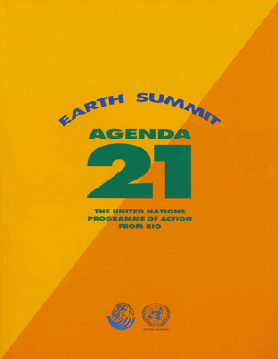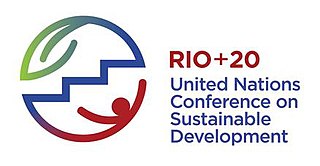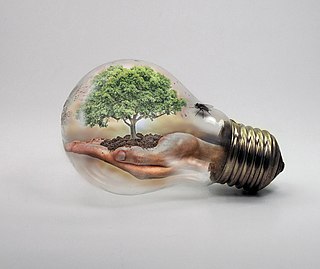Related Research Articles

The United Nations Economic and Social Council (ECOSOC) is one of the six principal organs of the United Nations, responsible for coordinating the economic and social fields of the organization, specifically in regards to the fifteen specialized agencies, the eight functional commissions, and the five regional commissions under its jurisdiction.

Agenda 21 is a non-binding action plan of the United Nations with regard to sustainable development. It is a product of the Earth Summit held in Rio de Janeiro, Brazil, in 1992. It is an action agenda for the UN, other multilateral organizations, and individual governments around the world that can be executed at local, national, and global levels. One major objective of the Agenda 21 initiative is that every local government should draw its own local Agenda 21. Its aim initially was to achieve global sustainable development by 2000, with the "21" in Agenda 21 referring to the original target of the 21st century.

The United Nations Conference on Environment and Development (UNCED), also known as the Rio de JaneiroConference or the Earth Summit, was a major United Nations conference held in Rio de Janeiro from 3 to 14 June 1992.
The United Nations Commission on Sustainable Development (CSD) was a body under the UN Economic and Social Council (ECOSOC) tasked with overseeing the outcomes of the 1992 United Nations Conference on Environment and Development/Earth Summit. It was replaced in 2013 by the High-level Political Forum on Sustainable Development, which meets both under the General Assembly every four years and the ECOSOC in other years.

In the United Nations, the Millennium Development Goals (MDGs) were eight international development goals for the year 2015 created following the Millennium Summit, following the adoption of the United Nations Millennium Declaration. These were based on the OECD DAC International Development Goals agreed by Development Ministers in the "Shaping the 21st Century Strategy". The Sustainable Development Goals (SDGs) succeeded the MDGs in 2016.

Youth empowerment is a process where children and young people are encouraged to take charge of their lives. They do this by addressing their situation and then take action in order to improve their access to resources and transform their consciousness through their beliefs, values, and attitudes. Youth empowerment aims to improve quality of life. Youth empowerment is achieved through participation in youth empowerment programs. However scholars argue that children's rights implementation should go beyond learning about formal rights and procedures to give birth to a concrete experience of rights. There are numerous models that youth empowerment programs use that help youth achieve empowerment. A variety of youth empowerment initiatives are underway around the world. These programs can be through non-profit organizations, government organizations, schools or private organizations.

The United Nations Research Institute for Social Development (UNRISD) is "an autonomous research institute within the United Nations that undertakes multidisciplinary research and policy analysis on the social dimensions of contemporary development issues". UNRISD was established in 1963 with the mandate of conducting policy-relevant research on social development that is pertinent to the work of the United Nations Secretariat, regional commissions and specialized agencies, and national institutions.
The United Nations Conference on the Human Environment was held in Stockholm, Sweden, during June 5–16, 1972.

Felix Dodds, born Michael Nicholas Dodds, is a British author, futurist, and activist.
Peace Child International is a UK based charity focusing on youth entrepreneurship, employability, sustainable development and youth empowerment. It has United Nations Economic and Social Council Consultative status and promotes the concept of youth-led development.
"DESA's previous USG's". UN Department of Economic and Social Affairs. Retrieved 22 October 2012.
The Beijing Declaration was a resolution adopted by the UN at the end of the Fourth World Conference on Women on 15 September 1995. The resolution adopted to promulgate a set of principles concerning the equality of men and women.

Alhaji Dr. Kandeh Kolleh Yumkella is a Sierra Leonean agricultural economist, politician, and the former United Nations Under-Secretary-General and the Special Representative of the Secretary-General for Sustainable Energy for All. He was also the chief executive officer of the Sustainable Energy for All Initiative. Yumkella is a former Chairman of UN-Energy and a two-term former Director-General of the United Nations Industrial Development Organization (UNIDO).

The Youth Climate Movement (YouNGO) or International Youth Climate Movement (IYCM) refers to an international network of youth organisations that collectively aims to inspire, empower and mobilise a generational movement of young people to take positive action on climate change.

The United Nations Conference on Sustainable Development (UNCSD), also known as Rio 2012, Rio+20, or Earth Summit 2012 was the third international conference on sustainable development aimed at reconciling the economic and environmental goals of the global community. Hosted by Brazil in Rio de Janeiro from 13 to 22 June 2012, Rio+20 was a 20-year follow-up to the 1992 United Nations Conference on Environment and Development (UNCED) held in the same city, and the 10th anniversary of the 2002 World Summit on Sustainable Development (WSSD) in Johannesburg.

In the United Nations, the Post-2015 Development Agenda was a set of talks and discussion that led to the creation of the 2016 Sustainable Development Goals. This replaced the 2015 Millennium Development Goals.

The Secretary-General's Envoy on Youth serves as a global advocate for addressing the needs and rights of young people for bringing the United Nations closer to them. The Envoy's Office is part of the United Nations Secretariat and supports multi-stakeholder partnerships related to the United Nations system-wide action plan on youth to volunteer initiatives. The office also promotes the empowerment and foster the leadership of youth at the national, regional, and global levels, including through exploring and encourages mechanisms for young people’s participation in the work of the United Nations and in political and economic processes with a special focus on the most marginalized and vulnerable youth.

Established in 1992, the Major Group for Children and Youth is the United Nations General Assembly mandated, official, formal and self-organised space for children and youth to contribute to and engage in certain intergovernmental and allied policy processes at the United Nations.

Action for Climate Empowerment (ACE) is a term adopted by the United Nations Framework Convention on Climate Change (UNFCCC). It refers to Article 6 of the Convention's original text (1992), focusing on six priority areas: education, training, public awareness, public participation, public access to information, and international cooperation on these issues. The implementation of all six areas has been identified as the pivotal factor for everyone to understand and participate in solving the complex challenges presented by climate change. The importance of ACE is reflected in other international frameworks such as the Sustainable Development Goals ; the Global Action Programme for Education for Sustainable Development ; the Aarhus Convention (2011); the Escazú Agreement (2018) and the Bali Guidelines (2010).
Sustainable Development Goals and Lebanon explains major contributions launched in Lebanon towards the advancement of the Sustainable Development Goals SDGs and the 2030 agenda.
References
- ↑ "Rio+twenties Homepage" . Retrieved 4 June 2012.
- ↑ "United Nations, Rio+20 United Nations Conference for Sustainable Development, Major Group for Children and Youth". Archived from the original on 5 June 2012. Retrieved 4 June 2012.
- ↑ United Nations Non-Governmental Liaison Service. "Río+twenties publishes a Río+20 Participation Guide: an introduction for children and youth" . Retrieved 4 June 2012.
- ↑ International Institute for Sustainable Development (IISD) Reporting Services. "Rio+twenties Publishes Participation Guide for Children and Youth" . Retrieved 4 June 2012.
- ↑ One World, Global Justice online. "Rio+20: an introduction for children and youth". Archived from the original on 26 May 2012. Retrieved 4 June 2012.
- ↑ Vimeo.com. "Rio+20: an introduction for children and youth" . Retrieved 4 June 2012.